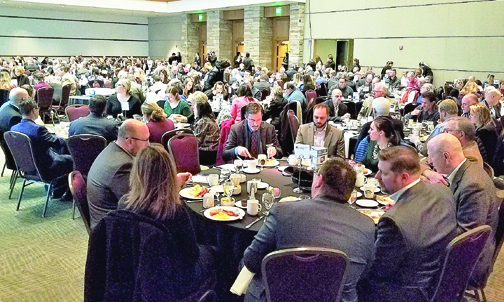(Before We Have To Fix Stuff?)
by Ruthy Wexler

The invitation to this year’s South Metro Denver Chamber’s “Economic Forecast Breakfast,” held at CU South, said attendees would learn “how Colorado businesses will fare under the new [Democratic] legislature.” But speakers at the January 18 event eschewed partisan concerns and concentrated on the big picture. J.J. Ament, CEO of the Metro Denver Economic Development Corporation, painted the positive half of that picture, describing past successes and a limitless future, while economist Henry Sobanet lobbed gentle warnings to the sold-out crowd: the world has changed, and Colorado must change with it.
Education And Transportation
Moderator, Lone Tree Mayor Jackie Millet, began the discussion — “How can we be successful, as a state, as a region? We can accomplish so much as a collective!” sounding a theme of collaboration that presenters would echo, in different ways.
Millet introduced Sobanet (“I always learn something when Henry talks!”), currently CFO for Colorado University, previously budget chief for Colorado governors Bill Owens and John Hickenlooper; Sobanet did, in fact, explain economic concepts in an unusually clear fashion.
“The world does not look like it did 10 years ago,” Sobanet began. “Ways of making a living have changed. The model of retiring after 30 years with one corporation, — certainly changed. Demographics have changed …”
Sobanet showed how the 65-and-older demographic will grow disproportionately by 2025, as will the 85-and-older set, previously not considered significant. Another rapidly growing group: those just entering the workplace.
“Fifteen to 20 years of globalization, a lot of automation and these demographic shifts … These are the forces underpinning economic issues.
“The aging population and the resultant impact on revenue and spending … are going to collide with an incoherent school finance system and insufficient money for infrastructure,” Sobanet outlined, then simplified: “The challenge going forward is education and transportation.”
Bad People Or Bad Systems?
The knotty heart of the matter, Sobanet offered, is three Colorado laws: the Gallagher Amendment, which in 1982 changed the way property tax was configured; TABOR (taxpayer bill of rights), which in 1992 began limiting the amount of revenue Colorado can retain and spend; and Amendment 23, which in 2000, changed how Colorado funds public schools.
As intently as everyone stared at Sobanet’s slides of pie charts and percentages, many found it difficult to grasp exactly how they connected. “I’m a financial person and even I didn’t quite understand,” said Louis Llanes, founder of Wealthnet Investments. But Llanes, like everyone, got Sobanet’s gist: these laws will prevent Colorado from getting the revenue it needs to thrive.
“Isn’t TABOR set up so if Colorado needs cash, they can ask the voters?” someone asked.
Yes, said Sobanet, who pointed out it wasn’t sensible to put these decisions on voters’ shoulders. “The laws, you’ve seen, are complicated. And for politicians to say they want taxes raised is political suicide.
“I’d like you to entertain a hypothesis,” Sobanet offered. “Is it bad people or bad systems?”
Colorado Loves Business!
J.J. Ament took the floor in typical upbeat fashion — “Let’s talk about economic growth!” — and recalled just how rapid Denver’s growth has been. “Back in the ’80s, you could drive a car from Union Station to the State Capitol Building and not worry about hitting a soul.
“Now, everyone wants to live here,” beamed Ament. “The Denver International Airport flies more places non-stop than any other airport! Denver is a brand!”
The potential for economic growth is endless if we do it right, Ament opined. “Denver is comprised of some 70 communities. But we have to take a regional approach. Businesses go elsewhere if they see we can’t get along.”
When Amazon put out requests for proposals in 2017, Ament gathered business leaders and submitted a package, including a film he showed that morning: ordinary and famous Coloradans happily claiming, “Colorado loves the outdoors!” “Colorado loves the Broncos!” “Colorado loves business!”
Amazon chose to build elsewhere but Ament, unfazed, regards the submission process with pride. “We spoke with a collaborative voice. Not with 70 different voices. One voice.” He shared other companies that recently relocated to Colorado, “like the VF Corporation, which brought 6,800 jobs.
“This is our goal,” Ament stressed. “The creation, recruitment and retention of good jobs.”
Takeaways
“My biggest takeaway was how we’re sweeping problems under the rug,” said Tom Skelley, of Evolution Communications Agency in Littleton, adding, “I really liked something J.J. said. ‘In between Utopia and the Apocalypse, we need legislators who make decisions based on facts, not ideology.’”
“I am one politician,” said Millet, “who advocated for sales tax to pay for transportation.”
“Colorado’s one of the top five states,” said an attorney on his way out the door. “But we got a C+ rating for infrastructure.”
“Now that you know a little bit more about how the systems work,” Sobanet said, “tell your public officials you would back them to change the system …
“The whole purpose of coming to an event like this is not just to make your business better. It’s making it all better.”
Not Here
Attendees began walking to their cars. Under the big Colorado sky, statues of bears and wolves dotted the snowy, quiet campus. “I’ve heard Henry has been pushing to raise taxes for years,” said a realtor who owns her own agency. “But it’s not gonna fly. Not here. There’s got to be another way.”
